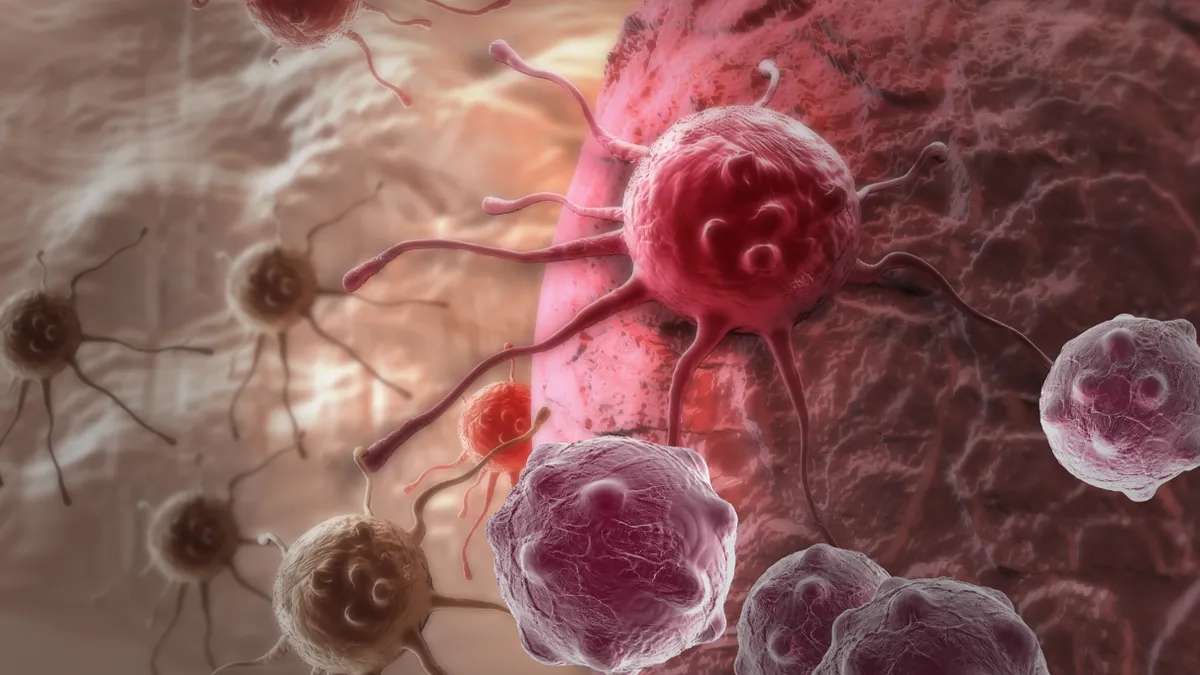Dive Brief:
-
Exact Sciences has bolstered its play for the colorectal cancer residual disease and recurrence market by striking a deal to buy Ashion Analytics from The Translational Genomics Research Institute (TGen).
-
News of the deal comes weeks after Exact Sciences licensed Tardis minimal residual disease (MRD) from TGen. Exact said the Ashion team will play a leading role in its effort to crack the MRD opportunity adjacent to its Cologuard colorectal cancer screening franchise.
- News of the takeover came the same day that Guardant Health disclosed availability of its liquid biopsy test for the detection of residual and recurrent colorectal cancer.
Dive Insight:
One year ago, Guardant outlined plans to bet big to muscle in on the colorectal cancer testing space. The plans moved Guardant onto turf dominated by Exact Sciences, which made noninvasive testing for colorectal cancer possible through its stool DNA test Cologuard.
On Tuesday, both companies provided updates on their plans. In conjunction with its fourth quarter results, Exact Sciences disclosed an agreement to buy Ashion, a CLIA-certified and CAP-accredited sequencing lab based in Phoenix, Arizona. Exact framed the takeover as a way to boost the development of the Tardis technology it licensed from TGen last month.
"The talented team at Ashion will be instrumental in advancing Tardis for minimum residual disease testing," Exact Sciences CEO Kevin Conroy told investors on a fourth-quarter results conference call. "We just licensed the Tardis technology. We just announced that we will be acquiring Ashion. So give us a little bit of time here before we roll out exactly what the product strategy is."
Having struck back-to-back deals for Ashion and Tardis, Conroy argued Exact has the makings of "tremendously sensitive and specific technology."
However, while it is still getting its MRD strategy ready for a public unveiling, Guardant is already selling its blood-based test for residual disease and recurrence.
Guardant began providing its Lunar assay to researchers and biopharma companies in 2019. This week, the company disclosed the commercial availability of a product based on the assay, Guardant Reveal. Guardant is marketing the test as a way to find circulating tumor DNA in blood after surgery to identify patients with residual disease and to spot disease recurrence faster than existing tests such as carcinoembryonic antigen diagnostics and imaging.
The product moves Guardant into a new part of the cancer care pathway. With Guardant Reveal detecting residual and recurrent disease and Guardant360 guiding therapy selection, the company only lacks a colorectal cancer screening product. Guardant is working to fill that gap by completing a registration study due to finish enrolling subjects this year.
If successful, the screening trial will put Guardant in direct competition with Exact. For now, Exact is benefiting from the limited screening options available for colorectal cancer. Sales of Exact Sciences' Cologuard screening kit grew 9% in the fourth quarter as 8,000 new healthcare providers ordered the test to enable patients to get tested without undergoing colonoscopies.
Exact Sciences calculates its share of the colorectal cancer screening market rose amid the pandemic as healthcare providers sought out ways to test patients without meeting them in person.
However, the pandemic still created headwinds. The surge in COVID-19 cases late last year will dampen first quarter sales, Exact warned. Cologuard revenues are realized when the test is completed, so a fall in orders in the fourth quarter will only show up in the sales figures the following quarter.











